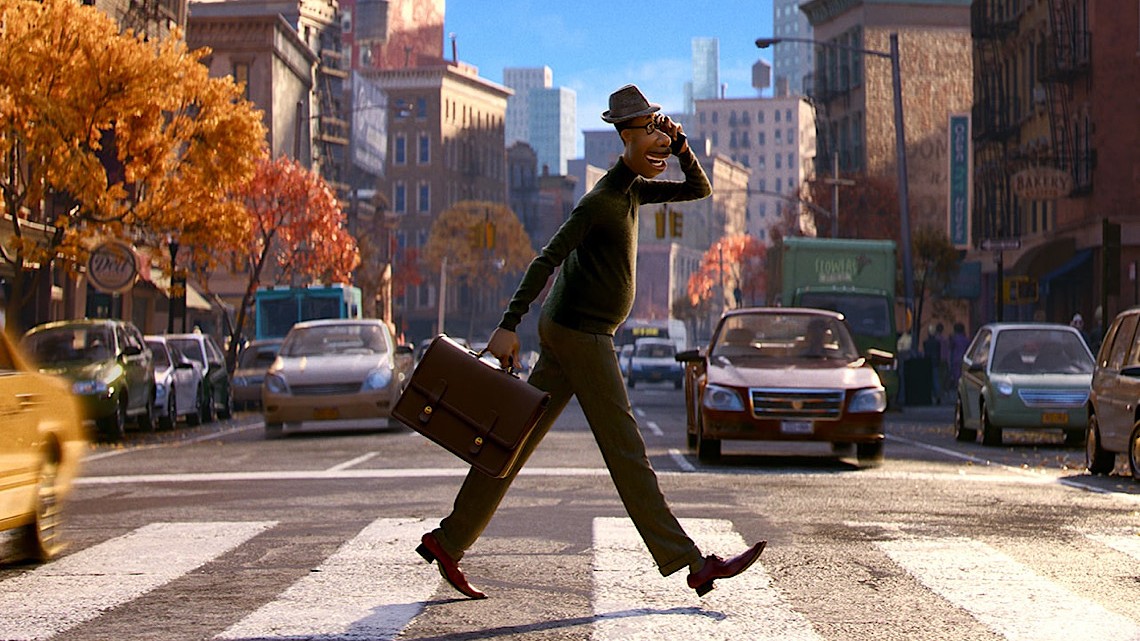“You haven’t cried enough this year!” threatened Pixar, dropping a movie at the tail end of 2020. “Yes, we definitely have!” we all replied, because we definitely have, and shedding one more tear before the new year might be fatally dehydrating. But then we remembered how good Toy Story 4 was, and how WALL-E was the indisputable high point of all of our lives, and we decided to give Pixar another chance. “Good to have you back,” said Pixar, installing Disney+ on every device across the globe. “This one’s called Soul, and it’s about death and overwhelming hopelessness. Enjoy!”
It doesn’t take long for Joe Gardner—middle school teacher, jazz pianist, and Pixar’s first Black protagonist—to die. Not ten minutes into Soul, right after receiving the opportunity of a lifetime, he falls into an uncovered manhole and his soul pops up in the afterlife. Or in a waiting room for the afterlife, rather: an escalator trailing up an endless black void, culminating in a giant white light that sizzles souls like a bug zapper. What’s beyond that is unknown—it could be nothing! It’s one of Pixar’s most grim visual landscapes, a far cry from the thriving vibrancy of Coco’s Land of the Dead. But it also tracks with the more mature direction Pixar signaled with their (hopefully) final Toy Story, a film that shifted the studio’s driving ideology from “no easy answers” to “no answers at all”. Joe Gardner isn’t ready to embrace the lack of answers seconds before he’s ferried into the Great Beyond, so he does what any of us would do in the face of uncertainty and hurls himself into the void.
After falling through an introduction to Soul’s abstract art style, Joe plops into somewhere called the Great Before, a metaphysical plane where unborn souls discover their passions before leaping to Earth through a hole in the ground. Joe learns through trial and error that souls can’t make it down to Earth without a “spark”, a patch worn by souls that have successfully found their passions in the Great Before. Luckily, he encounters 22, an unborn soul who doesn’t feel passionate about anything and never wants to go to Earth (it seems this is a recurring motif for neo-Pixar: a comic relief character that doesn’t want to be alive. Forky’s influence cannot be quantified.) Joe and 22 make an agreement—Joe will help 22 find their spark, 22 will give their spark to Joe, and Joe can return to Earth while 22 is off the hook forever in the Great Before.

It takes a lot of exposition to get all that out of the way, so much so that the lion’s share of it is delivered in a literal introductory seminar for the Great Before. The first act is a bare-bones affair of one-note characters and wacky worldbuilding—in other words, it suffers from the same syndrome as Inside Out, a movie with which Soul shares a writer/director. Joe likes music and he wants to live; 22 likes nothing and doesn’t want to live. Their pact is a no brainier. Their few characteristics bounce off of each other as predictably as Joy vs. Sadness, bouncing around Pixar’s new playground with jokes on their tongues and little to worry about. The rules of the Great Before are pretty lax, so the afterlife worker on Joe and 22’s tails—Rachel House basically reprising her role from Hunt for the Wilderpeople—is the biggest obstacle, and they’re essentially just another source of comic relief.
Soul really feels like it starts around the 40-minute mark, when the plot shifts gears dramatically and heads in a direction not revealed in the film’s marketing. It’s a nice “I didn’t see that coming!” moment, and it finally puts the protagonists in a situation that breeds conflict and establishes stakes, though Soul never feels like it catches up from kicking those in so late. The thematic profundity expected of Pixar still ripens in due time—particularly in a quiet, visually stirring sequence that’s reminiscent of Ratatouille but with existential meaning instead of food—but when the film reaches its big Pixar cry moment, the too-late development of the character in question holds the impact back ever so slightly. It’s worth a good cry, of course, but its emotional import doesn’t match the scope of the film’s life-and-death purview. Soul is one of the few Pixar films to hit the brain harder than the heart. The surprisingly abrupt ending only confirms that the team wasn’t sure how to stick the landing of such a massive jump.
Still, this is an appreciably mournful entry in the Pixar canon, and the studio’s usual talents—boundary-pushing animation, solid voice work, and a dollop of imaginative thinking—are here and accounted for. Soul may not feel as fleshed out as their best work, but it’s another step forward in wisdom: a zany lesson that the hardest answer we have to live with is the lack of one.
★★★½ (3.5/5)




